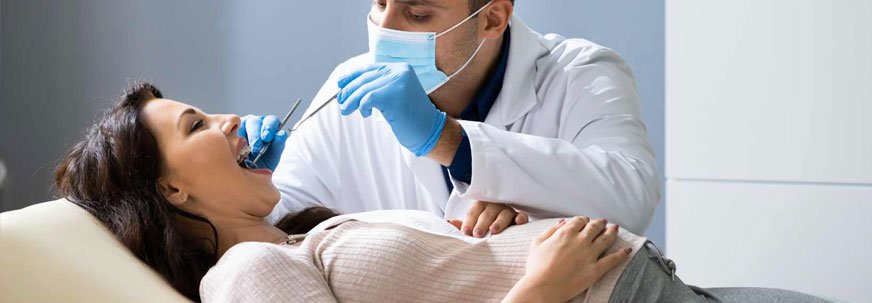Pregnancy is a special time, but it can also bring unique health challenges, including dental issues. One common concern among expecting mothers is whether it is safe to undergo teeth extraction in pregnancy. At Al Dhabi Dental and Orthodontic Centre, we understand the importance of balancing your oral health with the safety of your baby. This blog will guide you through when tooth extraction might be necessary, safety precautions, and the best time for treatment.
Understanding the Need for Teeth Extraction in Pregnancy
Pregnancy hormones can affect the gums and teeth, making them more sensitive and prone to issues such as:
- Gum inflammation and bleeding
- Tooth decay
- Infections and abscesses
- Wisdom tooth problems
If a tooth becomes severely decayed, infected, or damaged, teeth extraction in pregnancy might be necessary to prevent the spread of infection and protect your overall health. Untreated dental infections can be harmful not only to you but also to your baby.
Is Teeth Extraction in Pregnancy Safe?
Yes, teeth extraction in pregnancy can be safe—when performed under proper medical supervision. The safety of the procedure depends on:
- Gestational age – The timing of the procedure matters.
- Reason for extraction – Emergency extractions are sometimes necessary to prevent further complications.
- Medical history – Your dentist and obstetrician will work together for a safe treatment plan.
Best Time for Teeth Extraction in Pregnancy
Dentists generally recommend the second trimester (weeks 14–20) for most non-urgent dental procedures. Here’s why:
- In the first trimester, your baby’s organs are developing, so avoiding unnecessary dental work is preferred.
- In the third trimester, lying back for long periods can be uncomfortable and may restrict blood flow.
However, if you have a severe infection, teeth extraction in pregnancy can be performed at any stage because untreated infection poses a higher risk to both mother and baby.
Local Anesthesia and Medications in Pregnancy
A major concern for expecting mothers is the use of anesthesia and medication during dental treatments.
- Local anesthesia (like lidocaine without epinephrine) is generally considered safe.
- Only pregnancy-safe antibiotics and pain relievers are prescribed.
Always inform your dentist about your pregnancy, any medications you are taking, and your medical history before the procedure.
Safety Tips for Teeth Extraction in Pregnancy
To ensure a safe and smooth dental experience:
- Consult your obstetrician and dentist before scheduling the procedure.
- Opt for the second trimester if the procedure is not urgent.
- Use pregnancy-safe anesthesia and medications only.
- Position yourself comfortably to avoid pressure on your abdomen.
- Maintain good oral hygiene to prevent future dental problems.
Preventing the Need for Teeth Extraction in Pregnancy
While extractions may sometimes be unavoidable, prevention is the best approach. Pregnant women should:
- Brush teeth twice a day with fluoride toothpaste.
- Floss daily to prevent gum disease.
- Eat a balanced diet low in sugar.
- Attend regular dental checkups for early detection of problems.
Why Choose Al Dhabi Dental and Orthodontic Centre
At Al Dhabi Dental and Orthodontic Centre, we prioritize the comfort and safety of pregnant patients. Our experienced dentists use advanced equipment and follow strict safety protocols when performing teeth extraction in pregnancy. We also coordinate with your obstetrician to ensure every step of the procedure is safe for you and your baby.
Final Thoughts
Teeth extraction in pregnancy is sometimes unavoidable, especially if you have severe tooth decay or infection. The procedure can be safe with the right precautions, timing, and an experienced dental team. With professional care, you can protect both your oral health and your baby’s well-being.
Contact Al Dhabi Dental and Orthodontic Centre Today
If you are pregnant and experiencing tooth pain or dental infection, contact Al Dhabi Dental and Orthodontic Centre for a safe, professional consultation. We provide gentle care and ensure your safety at every stage of pregnancy.
